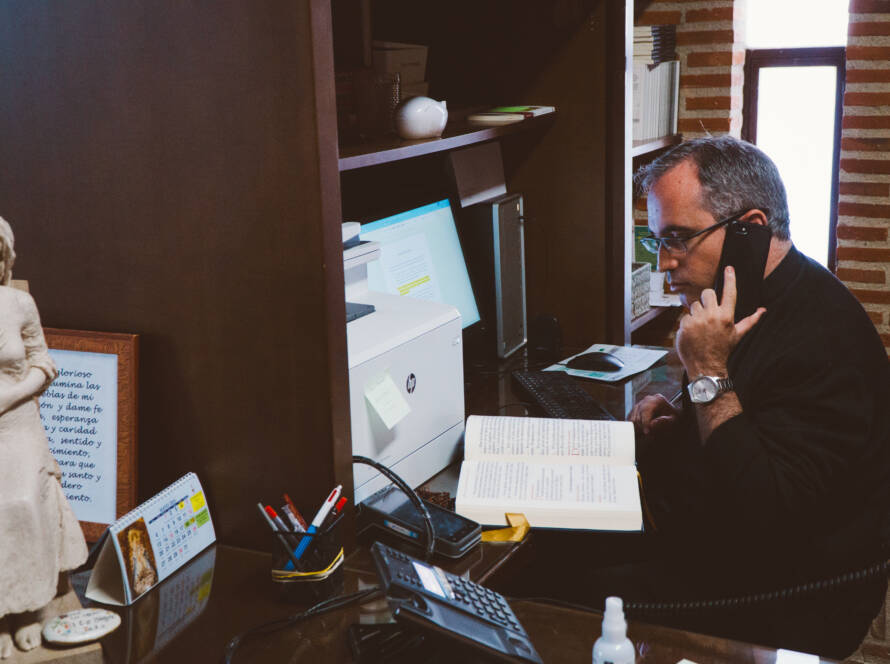We are delighted that two long-serving members of our community were acknowledged with ‘Benemerenti’ medals and certificates from Pope Francis last December. These rare honours are a testament to the dedication and inspiration they give to us.
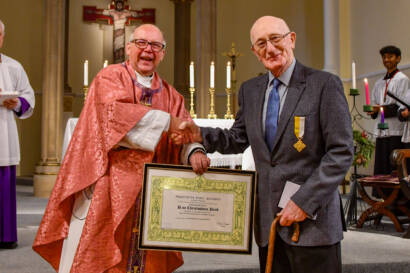
Congratulations to Chris Pond and Sue Joy.
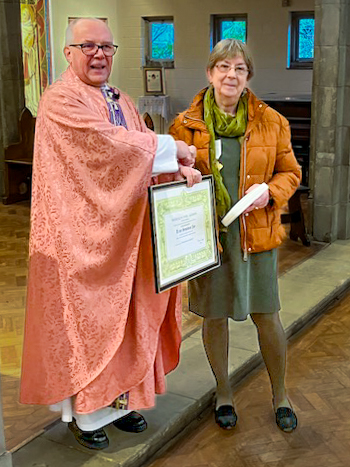
The Benemerenti Medal, meaning “Worthy of Merit,” is a rare and prestigious honor, with fewer than 20 awarded annually in the UK to both clergy and laity. These medals are bestowed by the Holy See to individuals who have demonstrated exceptional dedication and service to Catholic principles, the Church, and society. Instituted by Pope Gregory XVI in 1832, the Benemerenti Medal recognizes those who have shown unwavering faithfulness and love for the Church through their distinguished contributions.
Why is it important to the Community?
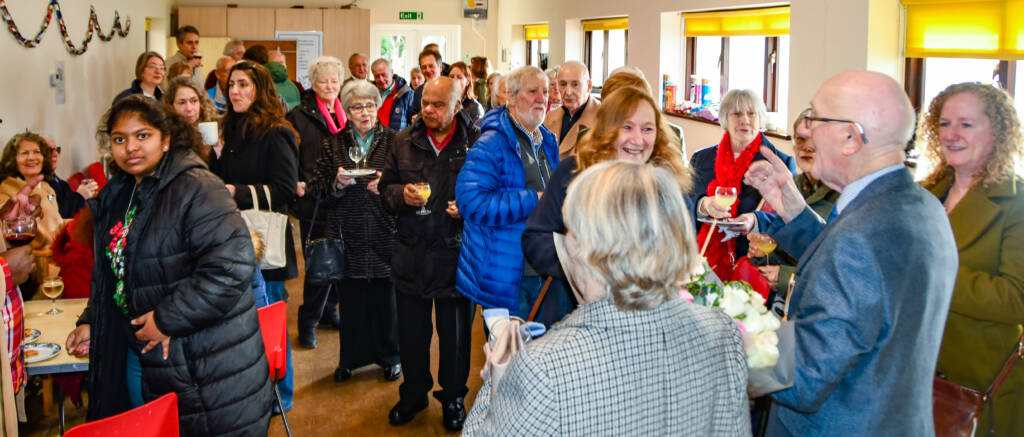
- It recognises the person for their service to the Catholic Church and their fellow man
over a long and sustained period. - It recognises those who in many roles work with that person on all that person’s
different activities: Finance and Council roles, Refugees, SVP, Justice and Peace, St Peter’s School roles, Food bank, Missio, Fair Trade, Children’s Liturgy, Lourdes Pilgrimage, the SVP’s two Conferences, Parish 100 clubs, Catenians……the list is very long for both recipients. For both Sue and Chris, the roles have come and gone over decades but always with love and inspiration for others to follow. - It offers a sense of pleasure to the entire Community for Sue and Chris to have received a well-deserved Papal Honour. Surely something for all of us to celebrate.
How does the honour come about?
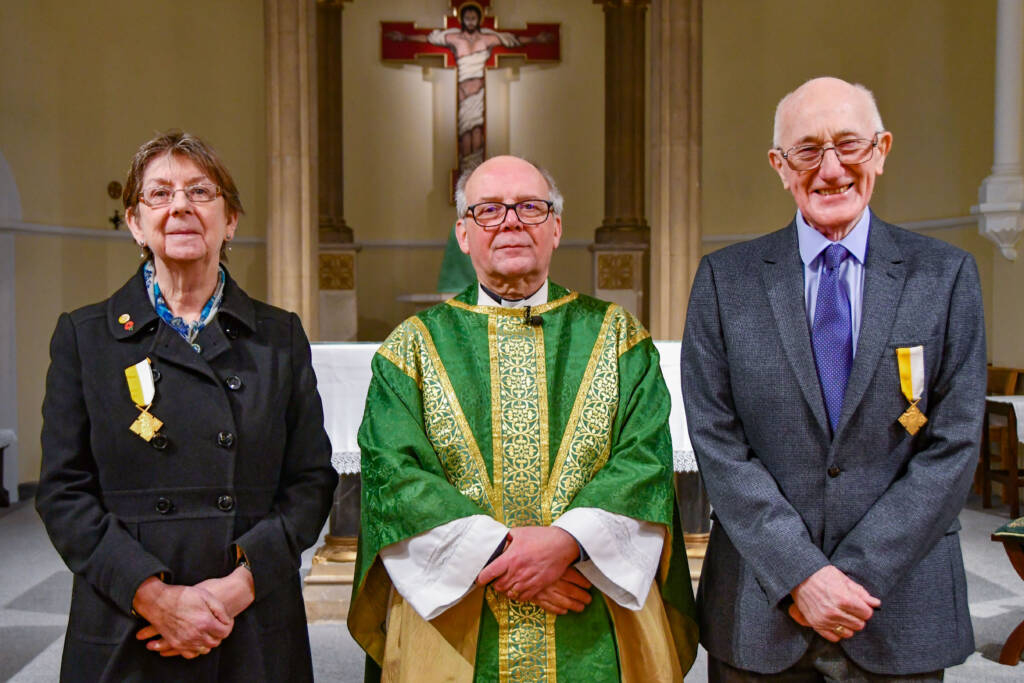
The process starts at Parish level. The Parish Priest may initiate the process, or members of the Congregation may put forward a recommendation which is then endorsed by the Parish Priest.
Then the long process of producing the recommendation, with all the checks and balances starts. This can take a few months to produce and validate. Once satisfied the Parish Priest sends the application in written form to his Bishop for approval; not necessarily a foregone conclusion as Bishops may and do raise questions for the Priest.
The record of the application is kept, and with the Bishop’s approval the application is sent to the Papal Nuncio: the Vatican Ambassador to the UK. With his approval it goes to Rome.
When approved the award follows the same route back to the Parish Priest. Such scrutiny is designed to ensure that these awards are not devalued, and that the recipient is indeed “Worthy of Merit”.
A reflection from Chris
It is so difficult for the recipient to determine, to identify, why he or she was chosen to “Receive a Papal Award.” Straightaway, my own reaction was the usual, to be expected, “Why me?”
Father pinned a medal to my chest in front of a Mass congregation, and I turned to face it to a wave of applause and congratulations. At that moment, what was the feeling that swept over me, facing so many of my peers? Well, I tell you, it was one of absolute humility. Why me? Seeing so many familiar faces, why not him? Why not her? It was all I could immediately manage, but here they all were, today, all applauding ME!
Looking back, and to be quite honest, the seeds of my devotion to duty were probably formed accidentally. Yes, by the accident of the time, the place, the circumstance of where I was and when I was there, and certainly not the seed of a grand plan to one day be honoured with a BeneMerenti medal. I have always shrunk from being “the one to be lauded,” although, across the years, while I might seem to have been the one to “drive” events, I have never sought to be the one whose “star” shone the brightest as a consequence of them.
No competitive sportsman able to build up a cabinet, in 85 years, my Papal Award is the third event of any occasion when I have been honoured. The first was winning a St. Christopher memento in a class religious quiz in 1952. So, I harboured no grand plan.
Anyway, to suit a company career plan, we moved to East Grinstead in 1973. Myself, Margaret, and five young children then aged from ten down to one (the “ones” being twins).
And, quite simply in a way, my commitments to duty developed just from that. We were seven practising Catholics, with a parish church to attend plus a commitment to Catholic education. These all served to produce an alchemy of involvement that grew across the years: PTA’s, school fairs and fetes, parish social committees, schools governance involvement, parish rotas (reading, ministries, welcoming), Parish 100 Club, Catenians formation, Sunday refreshments rota, Parish Finance Committee, altar serving (a renaissance), and Missio (the Red Box).
The list is not exhaustive, but it serves to demonstrate how dedication to a particular ethos—well, the Church in my case (not overlooking a very supportive wife who developed her own range of commitments)—might demonstrate a strong measure of service to a parish, particularly if one does not move on in fifty years!
But I cannot move away from my earlier point of view that enveloped me when I was presented with my order of BeneMerenti and turned to face my peers: humility. Thank you to so many people who have made it possible for one who has never sought to be honoured to find himself in that position.


